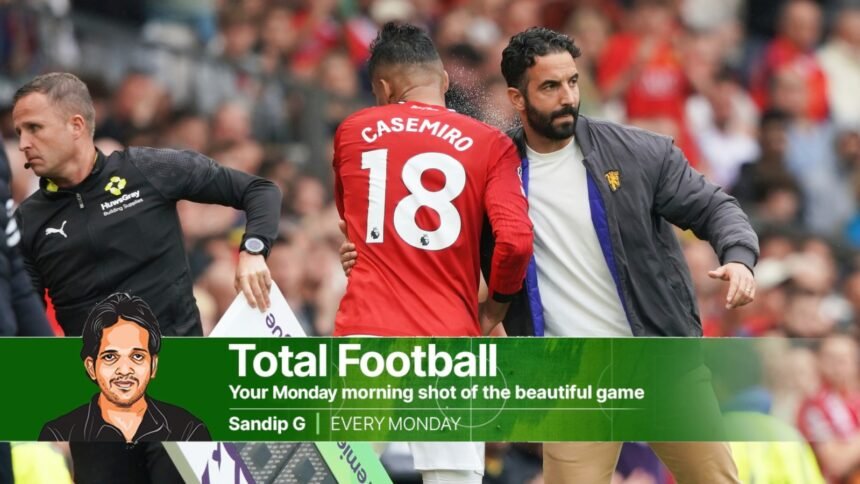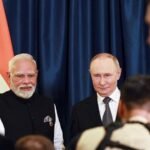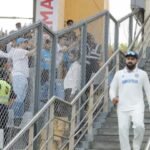Under the screaming rain, after the hysteria of the goal had ebbed, Bruno Fernandes sunk to the turf, shut his eyes, prayed and wept. The Manchester United talisman, the human mirror of all the emotions the clubs experiences in their most chaotic phase, was in a state of cathartic bliss, his perfect spot kick in stoppage time had reclaimed the club the lead, and six interminable minutes, the first full points of the season. If the club, not so much as battered as they are beleaguered, could reflect on this moment, as a snapshot that changed their season around, or, more damningly, one of the hundreds of false-dawn moments the club has celebrated, and later, forgotten in the rinse-repeat cycle of crisis.
Whatever the eventual resonance of the moment be, it captured the plight of the most storied club in the Premier League club. Revelling in the rain after scraping past a promoted side that had a weaker defence than Courtney Walsh. But little moments like these could instil belief, a spark that could raise the thunder, a kiss of life, perhaps. Or so the multitudes of their disillusioned, but now ecstatic, fans hope. It’s the story of their lives in the post Alex Ferguson era—little things make them happy, little things make them sad.
The reality, though, is somewhere between. For all his unwavering dogma, Ruben Amorim’s grand scheme is assuming outlines, but rough rather than definite. His squad, and the tactics he thrusts on them, are imperfect, but the club is not as hopelessly hopeless (chaotic, yes!), as they are projected. There is a paradox at play, all these years, the lament was they didn’t have a playing philosophy. Now that they have discovered a manager who has, at least hypothetically, a grand ideology, the grouse is that he is too inflexible and too dogmatic. The verdict on him has been passed too soon. Just 293 days into his reign.
Many of those days, his men were less of a team than an accumulation of confused individuals, rebelling against the concepts of Amorim, still wrapping their heads around his idea of tactical stiffness. Wingbacks staying wide, elongating the pitch laterally and vertically, midfielders staying really central, two No 10s buzzing behind the striker drifting across the pitch and breaking the lines, swapping the sides, the build-up play starting from the defensive trio. When everything clicks, as it fleetingly had this season, especially in the attacking half, they can be a thrilling side, full of pace, guile and energy. Though United have scored only four goals in three Premier League Games, they have created ample chances (58 attempts, 16 shots on goals, three striking the woodwork, a missed penalty), but a combination of clumsy finishing and some excellent goalkeeping had let them down. Some day, Matheus Cunha and Bryan Mbuemo begin replicating the goal-scoring stimulus they had shown last season; or Benjamin Sesko evolves into the poacher he is touted to be; or Mason Mount rolls back his Chelsea days. Or Amad Diallo, or Bruno, or Joshua Zirkzee. The group is not inept enough to keep missing chances. Perhaps, the weight of the shirt is weighing them down; maybe they are trying too hard to impress.
 Bruno Fernandes with Man United teammates after scoring a winner in the extra time against Burnley. (AP)
Bruno Fernandes with Man United teammates after scoring a winner in the extra time against Burnley. (AP)
But the forward-line has been the least of their problems. The rest is though. The makeshift midfield has not the legs and physique to implement the press-resistance Amorim expects from his central midfielder. Bruno is not a deep-lying playmaker. He has tireless work-rate, is combative, and wears the heart on his sleeve, but he is prone to losing the ball, not as efficient as a specialist in keeping the ball, and beyond everything, his best traits are wasted in the role. Casemiro still has vision and muscle, but the legs have lost their pace and can be so easily out-run. Manuel Ugarte doesn’t have the technical refinement; Kobbie Mainoo, while smooth and imaginative, doesn’t possess the muscularity to boss the midfield. A classical No 6 could immediately solidify the midfield, and prevent freeway-like run-throughs through the heart.
The flimsy midfield puts stress on the back-three. Amorim prefers centre backs with ball-progressing skills. The best among the lot are Leny Yoro and the injured Lisandro Martinez. Once Luke Shaw gets used to his new role as a left-sided centre-back, he too would bring utility in this regard. The back-three, this season, looks more coherent this season, except for the confusion in dealing with high balls into the box. Three of the four goals United had conceded this season exposed this vulnerability. A nervous goalkeeper—be it Altay Bayindir or Andre Onana in the league tie humiliation—has exaggerated the flaw. Things could change with the reported arrival of Emi Martinez, a goalkeeper of an imposing persona, could give United the leader at the back.
Thus, Amorim’s project is worth investing in. Ideas, especially as peculiar as the Portugueses’s, would take time to bear fruits. In the process, United could suffer more, to use a word Amorim often resorts to. The project might fail, Amorim longevity maybe as long as the next game he loses, but a drop of patience would do the club little harm. No manager had lasted more than 35 months since Ferguson retired. United could at least wait for a season more to hand the pink slip to Amorim. There are lessons from Liverpool, who stuck with Jurgen Klopp despite a rocky start, and Arsenal, who kept their faith in Mikel Arteta after two years of schizophrenic results. Lest, the night Bruno cried and wept would turn into just another forgotten false-dawn moment.








